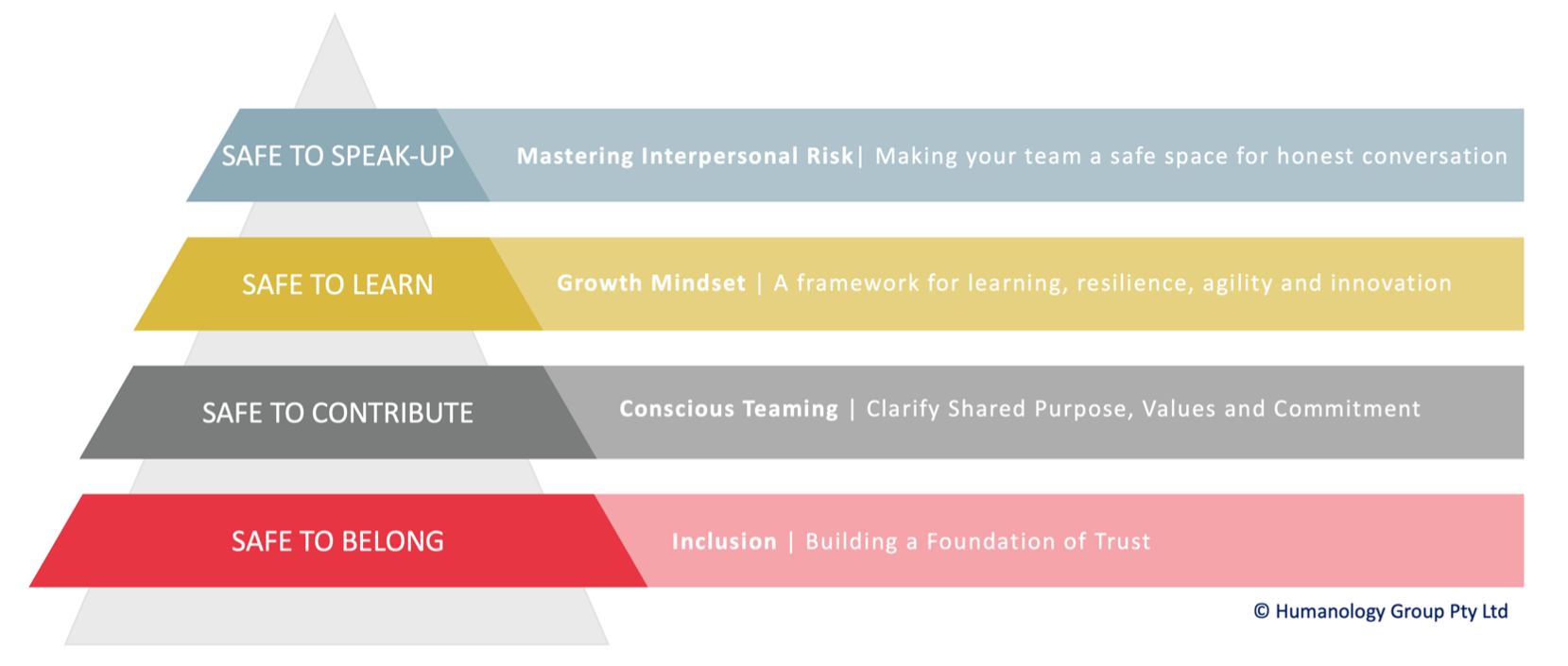
PSYCHOLOGICAL SAFETY
Culture eats strategy for breakfast.
Psychological Safety eats culture for lunch.
Psychological Safety is the essence of Humanology Group’s vision to bring humanity to the workplace.
In 2012, Google embarked on a quest to discover the key ingredients to high-performing teams. Codenamed ‘Project Aristotle,’ researchers analysed 180 teams and 250 team attributes over a 2-year period to identify the underpinning characteristics of an exceptional workforce. Surprisingly, they found that the teams that had the highest engagement, elevated productivity, the greatest sense of well-being and belonging, and the greater innovation had one single identifying characteristic in common – Psychological Safety.
What is Psychological Safety?
Psychological safety is a culture where all individuals feel safe to speak up, discuss ideas, contribute their thoughts, give candid feedback, take interpersonal risks, report incidents or faults, and admit fallibility without fear of interpersonal reprisal from colleagues or superiors. Psychological Safety has been identified as the key predictor of high performing teams and safer teams (Edmondson, 2019).
A work environment with high psychological safety is:
- A speak-up workplace – safety concerns, bullying, harassment, and exclusion is identified and individuals are comfortable to discuss concerns and generate solutions.
- A learning environment– employees feel valued and safe to make mistakes and try new things.
- A high performing and innovation environment– innovation and thinking outside-the-box to reach ambitious goals as a team is encouraged.
- An environment of trust – interpersonaltrust and mutual respect are purposefully built and invested in, so people are comfortable being and expressing themselves
Why Psychological Safety Matters
In a world characterised by volatility, uncertainty, complexity and ambiguity (VUCA), the ability to foster a psychologically safe climate must become a leadership priority for companies who want to keep up in the global competitive race.
Without Psychological Safety, it becomes incredibly difficult to innovate. Innovation is crucial to develop new business ideas, stand out from your competitors and attract the best talent. Quite simply, when people don’t feel safe enough to share their ideas, disagree or give feedback, it makes it almost impossible for creativity and innovation.
In safety-sensitive environments, such as aviation, construction or mining, the ability to speak-up quickly and freely to ensure corrective safety measures could save a life.
Teams thrive when there are high levels of Psychological safety. In a team of diverse individuals, the ability to freely share knowledge, discuss ideas, admit mistakes and give feedback truly creates an inclusive and valued team environment.
Understanding Psychological Safety
Psychological Safety can be broken down into four simple components that measure fundamental human needs: SAFE TO BELONG, SAFE TO CONTRIBUTE, SAFE TO LEARN and SAFE TO SPEAK UP.
When individuals have high levels of Psychological Safety in all four of these areas, their fundamental human needs are met, which enables inclusion, wellbeing, innovation, engagement, productivity, accountability and safety. Psychology safety can be established by ensuring your teams basic needs are met. In order for team members to feel Safe to Speak Up, a team must work through the hierarchy of needs, commencing at Safe to Belong.
The journey towards Psychological Safety
Psychology safety evolves through a hierarchy based on the natural sequence of human needs. The first human need of feeling Safe to Belong must be met, prior to moving to the second need to feel Safe to Contribute. Once these needs are established, humans can move to feeling Safe to Learn and then finally Safe to Speak-Up. Time must be taken to work through this hierarchy and embed foundations at each level.


The Psychological Safety Profile for Teams (PSP-T) is an evidence-based Psychological Safety team assessment tool that allows organisations to measure the level of Psychological Safety across teams. The PSP-T is based on Amy Edmondson’s extensive research on Psychological Safety.
The PSP-T utilises Humanology Group’s model of human needs to interpret Psychological Safety data and is based on over 30 years of research by Harvard University. The questions reliably and accurately measure the Psychological Safety of a team. We create a baseline for team Psychological Safety and the PSP-T re-assessment function provides immediate feedback and enables businesses to track progress of interventions.
CASE STUDIES
INTERNATIONAL MINING COMPANY
Humanology Group Partnered with an interntional mining company in 2019 to deliver a 2-year program focused on Leadership Development and to increase team effectiveness and collaboration, with a focus on Psychological Safety and a learning (growth) mindset. In 2020, this program was accelerated by the unprecedented environment that Covid-19 created. Bringing together the company’s values of “Care” and “Innovation”, their vision of achieving a ‘speak up’ culture and learning agility, and Humanology Group’s approach, we implemented a Psychological Safety program for Leaders and teams which identified critical behaviours and actionable team routines to drive cultural change from the top down, team by team, leader by leader. Delivered Leadership Workshop and Leadership Coaching to over 200 leaders during the height of the COVID-19 pandemic in 2020, focusing on leading through uncertainty, growth mindset and psychological safety. Leadership Coaching and systemic team coaching was implemented to embed Psychological Safety into the cultural framework of the company is ongoing.
Project objectives
- Provide workshops, coaching support and strategies for leaders to effectively manage their teams through uncertainty with agility and a growth mindset, and build a climate of Psychological Safety.
- Identify at-risk teams and implement appropriate additional interventions utilising both existing internal resources such as EAP etc and specific Psychological Safety interventions.
- Provide leaders with individual support to maintain their own wellbeing and resilience.
Project highlights:
200+ LEADERS | 3000 WORKFORCE|
20+ LEADERSHIP WORKSHOPS| 389 LEADER COACHING SESSIONS – All delivered virtually using Web Conferencing Software, Miro Whiteboard tools and our own assessment software.
Intensive 8-week project | Ongoing intervention and support of High-Risk teams
Challenges:
- Delivered virtual team workshops and leadership coaching to 200+ senior leaders and 20+ teams to support their 3000-person Queensland operations (from CEO, Executive Leadership Team, General Managers and Site Leadership teams) at the height of the COVID-19 pandemic. As a result of the pandemic, FIFO/DIDO rosters and all sites on split-rosters (half of each team working from home and half working from site).
Outcomes:
- Achieved an incredibly successfully outcome, with all individual and team coaching sessions run virtually.Leaders who wished to have continued support access coaching session to work on their own development goals throughout the project duration continued to receive coaching.
- Significant behavioural and cultural shifts have been measured since the beginning of the project. Psychological Safety (a culture where all individual feel safe to speak up, discuss ideas, contribute their thoughts, give candid feedback, take interpersonal risks, report incidents or faults, and admit fallibility without fear of interpersonal reprisal from colleagues or superiors) was measured in every team at the beginning of the project.
- As a result of leadership coaching, leaders embarked on a significant behavioural shift, which was cascaded within their team. (The most effective leaders create Psychological Safety within their team).
- Teams were reassessed after 6 and 12 months, with a significant increase in Team Psychological Safety measured, as well as an increase in mental health and wellbeing of the team.
- Leaders have cascaded team norms to increase Psychological Safety down to their own leaders and teams, creating a significant cultural and behavioural shift in the wider business.
